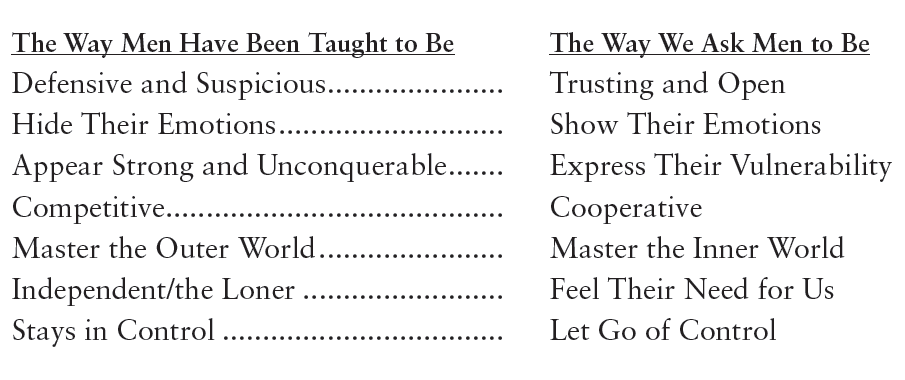
Полная версия
Secrets About Men Every Woman Should Know



(They) learn early that only a narrow range of emotion is permitted … aggressiveness, competitiveness, anger, … and the feelings associated with being in control. As we grow older, sexual feelings are added to the list. weakness, confusion, fear, vulnerability, tenderness, compassion and sensuality are allowed only to girls and women. A boy who exhibits any such traits is likely to be made fun of and called a sissy or a girl (and what could be more devastating?).
These days many new parents attempt to avoid stereotyping their children based on gender. But most of the adult men you and I are having relationships with are victims of this early-childhood conditioning.
How TV Teaches Us Sex Roles
As young children, most of us learned how to view ourselves as males and females not only from our parents but from the thousands of hours we spent watching television. There have been some fascinating studies of how men and women are portrayed on TV, and the results are disturbing:




Picture the man in your life during the years when he was a little boy, sprawled in front of the TV set watching program after program, and commercials in between, all depicting men as strong, cool, unemotional, always in control, afraid of nothing. Whether his hero was the Lone Ranger, Zorro, Batman, Maverick, the boys of Bonanza, Peter Gunn, or any larger-than-life cowboy, detective or tough guy, your man knew how he wanted to be when he grew up. By the way, these programs never showed Zorro’s wife, or the Lone Ranger’s girlfriend. No, for these TV role models, intimacy meant having a horse, or maybe a male sidekick, but never a woman.
In case the man in your life grew up with radio rather than TV, he isn’t off the hook – radio dramas contained the same kinds of stereotypes as TV programs, which grew out of the radio days.
The Challenge of Changing Times
By now you’re beginning to understand a lot more about why men are the way they are – why “to be a man” means to hide one’s emotions, to fight off the competition, to struggle against the harsh world and survive, to cling to one’s independence, to stay in control. Men are pulled by habits passed down from generation to generation, and are conditioned by their parents and society, which teach them values that close them off to intimacy.
By deciding to be the “real man” society has taught him he must be, a man chooses to embody the very qualities that make it impossible for him to open up and experience true intimacy with the woman he loves
This chart helps illustrate the tremendous emotional challenge men are facing today:

So here we are, modern women, telling the men in our lives that the characteristics they’ve worked so hard to cultivate are the very ones that drive us crazy and turn us off; and that the characteristics we really want to see them develop are the ones they have been taught to see as “weak” and “unmanly” and have fought so hard to avoid. When you think about it this way, it’s a lot easier to understand why men seem to resist changing, why they feel that we’re pressuring them unfairly, why they appear to be so bad at simple relationship skills that are so simple for us.
We expect men to be competent in skills for which they have absolutely no training – the very skills, it so happens, that women are best at – the ability to express emotion, to be intimate, to nurture, and to love
Over the past ten years I’ve worked with thousands of men, and I can assure you that men do want to open up, to learn to fell deeply and express those feelings to the women they love. But the process is a difficult, even frightening one for them, and I hope that, after reading this chapter, you can understand why. The men in your life need all of the compassion, patience, and support you can find in your heart, to help them open theirs.
The Chinese curse at the beginning of this chapter states: “May you live in changing times,” and these times are certainly changing. The old ways of living and loving don’t work anymore, and we still haven’t figured out the new ways. In the meantime we’re still trying to have relationships, and we’re experiencing a lot of disappointment and confusion in the process. But the challenge of change lies in the incredible opportunity it offers us for new levels of wisdom and new heights of personal growth. This book is dedicated to helping you turn your challenges with men into exciting new adventures in loving.
2 The Six Biggest Mistakes Women Make with Men
Do you ever suspect that everything you’ve been taught about how to behave with men is wrong?

Do you ever do something you are sure will please a man, and feel shocked when he reacts to it so negatively?

Do you ever feel that you must have received, a bad set of “instructions” for how to successfully relate to men, because nothing you try seems to work the way it’s supposed to?
If you answered yes to any of these questions, you’re not alone. I’ve worked with thousands of women in my seminars and support groups, and most of them knew that there was something very wrong in the way they related to men but weren’t sure what was wrong or how to change it. Part of improving your relationship with a man, whether it’s your husband, your boss, your boyfriend, your father, or your coworker, is not just understanding his behavior but taking an honest look at your own behavior as well.
How Healthy Are Your Relationships with Men?
Here’s a quiz designed to reveal the strengths and weaknesses in your relationships with the men in your life. For each question, select one of the following responses:
1 Almost always
2 Frequently
3 Occasionally
4 Rarely
5 Almost never
Answer each question as honestly as you can, choosing the response that applies to you most of the time. That means, don’t answer based on how you know you should behave, but on how you usually behave.
1 When I’m around a man I really like or am attracted to, I lose part of myself by censoring my communications, seeking approval, sacrificing my needs, or becoming much more self-conscious.
2 I find myself feeling responsible for the men in my life, and making sure they get done what they need to.
3 I allow men to get away with treating me in ways I’d never tolerate being treated by a woman.
4 I use my sexuality to get my way with men by flirting, teasing, using body language, etc.
5 I allow my fear of how a man might react to prevent me from doing what I want to do or saying what I really feel around him.
6 I feel resentful toward men for things they’ve done to me in the past, or for how they treat me now.
7 I act helpless, overwhelmed, or confused around men to get love or attention or to avoid dealing with their anger toward me.
8 I feel I receive all the respect and appreciation I deserve from the men in my life.
9 I always ask for what I want and need from the men I care about.
10 When I’m around powerful men (boss, Dad, authority figures), I feel relaxed and confident in myself. I don’t alter my behavior so that I appear either unusually pushy and aggressive or unusually timid.
Now, add up your total score. For questions 1 through 7, give yourself the following points:
A: 2 points
B: 4 points
C: 6 points
D: 8 points
E: 10 points
For questions 8 through 10, give yourself the following points:
A: 10 points
B: 8 points
C: 6 points
D: 4 points
E: 2 points
80-100 points: CONGRATULATIONS! Your hard work on yourself and your relationships has paid off, and you’ve learned how to be a powerful yet loving woman with the men in your life. You maintain a strong sense of yourself even when you’re around men who are important to you, and you know that good communication is essential for creating healthy and lasting relationships. To avoid future problems, work on those areas in which you had a lower score.
60-79 points: YOUR RELATIONSHIPS WITH MEN AREN’T BAD, BUT THEY COULD BE A LOT BETTER. Most women fall into this category. There are some warning signs you need to pay attention to, so that in time bigger problems don’t erupt. Work on expressing yourself and your needs more completely, and avoid the six mistakes women make with men, discussed later in this chapter. You deserve much more love than you’ve been asking for.
40-59 points: YOUR RELATIONSHIPS WITH MEN ARE IN SERIOUS TROUBLE. You have some bad emotional habits that are keeping you from receiving the love and appreciation you deserve. You’ll never get the respect you want if you continue to give up your power around men, behave like a doormat and pretend everything is fine. It’s time to make a change. The first step is to be honest with yourself about how dissatisfied you really are. Practice everything you learn from this book, ask your friends for support, and make a commitment to start living as the powerful woman you are meant to be.
39 points or below: EMERGENCY! YOUR RELATIONSHIPS WITH MEN ARE UNHEALTHY. You’ve been in pain and felt unloved for so long that you’ve probably forgotten what it feels like to be yourself around a man you really care about. You may not even know what a healthy relationship with a man is. It’s time to take immediate action, and you can’t do it alone. Reach out to other women for help; find a loving and experienced therapist; join some support groups; use this book as much as possible, and do whatever you can to begin to love yourself again. Fight off that numbness, negativity, and resentment. Stop playing the victim! Only you can make the change. You deserve much more than this.
I suggest you take this quiz over again from time to time to measure your progress in becoming a more powerful woman. First put the principles in this book into practice, and then come back to the quiz several weeks later. You should notice some real improvement reflected in a higher score, and you’ll be well on your way to creating the loving relationships with men that you deserve.
DO YOU BRING OUT THE WORST IN THE MEN YOU LOVE?
Whether you’re aware of it or not, you may be bringing out the worst in the men you love by how you behave around them.
I am not saying that the problems in relationships are all the women’s fault, or that how we behave is “wrong” or “bad,” or that men don’t need to change and we do. I am saying that how women act around men is 50 percent of the problem.
Many of the behaviors we’ve adopted to try to be “loving women” are the very behaviors that are destructive to our relationships with men
Of course, we don’t make these mistakes on purpose. Most of us were taught these behavior patterns by our mothers, and their mothers before them, but when we act out these old roles and habits, they end up making us feel bad about ourselves as women, and actually encourage men to treat us badly.
THE 6 BIGGEST MISTAKES WOMEN MAKE WITH MEN
1 WOMEN ACT LIKE MOTHERS AND TREAT MEN LIKE CHILDREN
2 WOMEN SACRIFICE WHO THEY ARE AND PUT THEMSELVES SECOND IN IMPORTANCE TO THE MAN THEY LOVE
3 WOMEN FALL IN LOVE WITH A MAN’S POTENTIAL
4 WOMEN COVER UP THEIR EXCELLENCE AND COMPETENCE
5 WOMEN GIVE UP THEIR POWER
6 WOMEN ACT LIKE LITTLE GIRLS TO GET WHAT THEY WANT FROM MEN
MISTAKE 1

Women Act like Mothers and Treat Men like Children
Have you ever said any of the following things to a man?
“Honey, did you remember your wallet?”
“Don’t forget to pick up the dry cleaning on the way home.”
“Did you remember to pay that overdue electric bill?”
“Do you realize the petrol is almost on empty?”
“You didn’t remember to make reservations? Never mind, I’ll call for you.”
“How many times do I have to remind you not to leave those wet towels on the floor?”
“Don’t you think you’re going to be cold with that light jacket on?”
If you’re like me, you’re cringing with guilt after reading this list. Mistake #1 is one of the most common and destructive habits we have with men. We treat men like children; we assume they can’t take care of themselves; we act as if they are incompetent, and that they need us to run their lives for them.
Now, I know what you’re thinking - that in many cases, these assumptions are true! And you may be right. But that’s not the point. What’s important is this:
WHEN YOU TREAT A MAN LIKE A LITTLE BOY HE’S GOING TO ACT LIKE A LITTLE BOY. WHEN YOU EXPECT A MAN TO BE INCOMPETENT, HE REMAINS INCOMPETENT
WAYS WOMEN ACT LIKE MOTHERS AND TREAT MEN LIKE CHILDREN
1. Acting overly helpful by doing things for men that they should be doing for themselves. We look for his keys; pick up after him; go in the other room to get him something he can easily find himself; straighten his tie; comb his hair; choose his clothes for him in the morning and lay them out on the bed.
2. Playing verbal guessing games with men, trying to pull information out of them. We say, “Okay, you’re hungry … are you in the mood for cereal? No? What about some pretzels? Not pretzels? Okay, then what about some nice soup? Not appealing. Hmm, let me think … I know … what if I make you a grilled cheese sandwich? Wouldn’t you like that?”
3. Assuming men will be absentminded or forgetful, and reminding them of information they should remember by themselves
“Don’t forget to call me when you get there.”
“Don’t forget to pick up Susie at her dance class.”
“Don’t forget the rubbish needs to go out tonight.”
“Don’t forget your doctor’s appointment after work.”
4. Scolding them as if they were children
“Where do you think you’re going without a jacket? Don’t you know how cold it is outside?”
“How many times do I have to tell you to turn the lights off before coming to bed. Our electric bill is outrageously high.”
“You ate a whole pizza and had three beers at Eddie’s house while you watched the match? No wonder you have a stomach ache.”
5. Taking charge of activities that you assume they can’t do right
“If I let Fred make our dinner reservations, he somehow gets the time wrong, and forgets to request a good table, so I just do it myself.”
“The last time I sent Steven clothes shopping with the kids, it was a disaster - they came home with stuff they could never wear to school. Now I just take them myself. I couldn’t stand to go through that again.”
“I asked Jason to find us a nice hotel in Chicago months ago, and wouldn’t you know that it ‘slipped his mind.’ NOW our trip is three weeks away, and I’m the one who ends up making the phone calls anyway. I should have just done it myself in the first place.”
6. Correcting and directing them
“No, honey, the couple we met on vacation were from Virginia, not West Virginia.”
“The way you just used that word in a sentence was incorrect, dear.”
“I think you should take the Westway to avoid the traffic on the Parade. In fact I’d get into the left lane now if I were you.”
“Why don’t you just call your mother up, and first tell her that the kids aren’t feeling well, and then mention how busy you are this week at the office. After she starts to feel concerned, then let her know that we’ve decided not to come to visit next Sunday. But whatever you do, don’t tell her we saw my mother last weekend.”
WHY WOMEN MOTHER MEN
I know you hate to think you might be taking a mothering role with the man you love, but believe me, you’re not alone. Why do we act like mommies and treat our men like children?

Julie had been married to Fred for three years when she came to me complaining about her relationship. “I don’t feel like Fred’s wife,” she said bitterly, “I feel like his mother! He seems to act like such a baby around me, expecting me to pick up after him, think for him, and be the one who ends up in charge. He’s getting lazier and lazier, and I’m getting more and more angry!”
Julie wasn’t even aware of how natural it was for her to mother Fred. She’d been blaming him for being immature for so long, that she’d never taken a look at her part in creating the problem. As we talked about her parents, we could both see the roots of Julie’s mommy game. “I can’t ever remember my mother and father being intimate or romantic with each other,” Julie recalled sadly. “My dad traveled a lot for his business, and my most vivid and common memories of my mother are of her packing for him before his trips, unpacking for him after his trips, making sure he remembered to keep his appointments when he was in town, and constantly fussing over his clothes. I guess by the time we were in our early teens. Dad was kind of like one of the kids. Mom would scold us and scold him; she’d shove lunches at us and shove his lunch at him. I never realized that, on some level, I must have concluded that loving a man meant treating him like Mom treated Dad.”
Until recently, being a mother was one of the only acceptable “professions” for women with nurse and teacher close behind. We grew up seeing our mothers rewarded for their nurturing behavior, and getting rewarded for that same behavior in ourselves: “Good Sally, you’re taking care of your little brother so nicely.” “Be a sweetheart, Jane, and bring Daddy his slippers - that’s my girl.”
WE OFTEN RETURN TO OUR MOTHERING BEHAVIOR WHEN WE WANT TO BE LOVED BY A MAN
Darlene, married for fifteen years, described it this way: “Whenever I feel like I’m not getting enough attention from Charlie, I definitely fall back into the mothering mode - I start baking his favorite dishes, or organizing his drawers for him, or trying to be as helpful as I can. What I really want is more affection, more intimacy, for him to act like more of a lover and not just a husband. Of course, this is the opposite of what I get - the grateful ‘son’ thanking me for being so considerate.”









